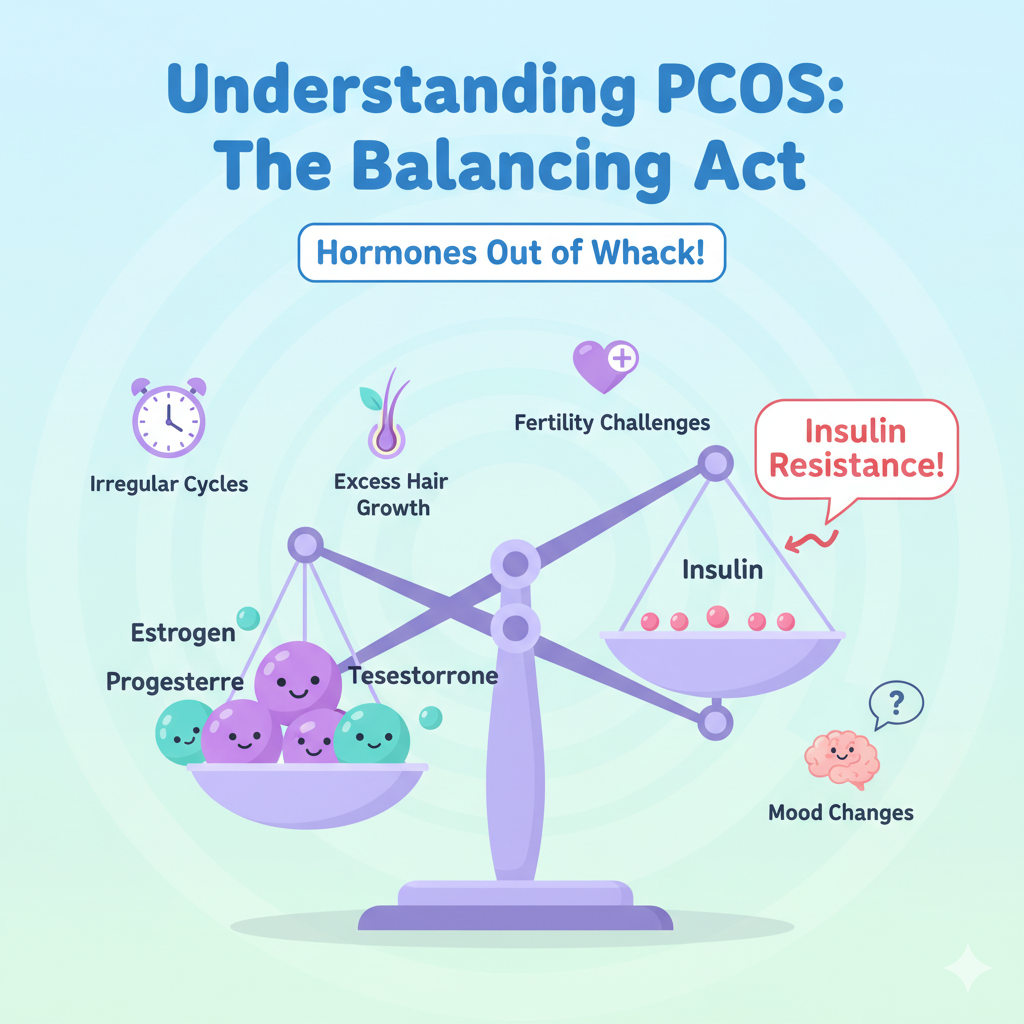Lifestyle Factors That Can Boost Your Fertility Health
Empowering choices you can make to support your reproductive wellness

Embarking on the journey to parenthood is a profound time of hope, anticipation, and planning. At Blossom Women’s Clinic, we understand that this path can also bring questions and stress. While fertility is a complex interplay of many factors, one of the most empowering aspects is that your daily lifestyle choices can have a significant and positive impact on your reproductive health.
Focusing on your lifestyle is not about achieving perfection overnight. It’s about making small, sustainable changes that create a healthy, balanced, and supportive environment for your body. Let’s explore the key areas where you can take charge to boost your fertility health.
Your 5-Step Fertility Boost Checklist
- Eat the Rainbow: Focus on whole foods, fruits, vegetables, and lean proteins.
- Move with Joy: Aim for 30 minutes of moderate exercise most days.
- Prioritize Sleep: Target 7-9 hours of quality, uninterrupted sleep per night.
- Manage Stress: Find 10-15 minutes daily for mindfulness, deep breathing, or a relaxing hobby.
- Ditch the Toxins: Reduce or eliminate smoking, excessive alcohol, and environmental toxins.
1. Nourish Your Foundation: The Fertility Diet
The saying “you are what you eat” is especially true when preparing for pregnancy. The foods you consume provide the building blocks for your hormones and affect the health of both eggs and sperm. A nutrient-dense diet is your first line of defense and support.

What “Moderate” Exercise Looks Like
Regular, moderate exercise is fantastic for boosting fertility. It helps maintain a healthy weight, reduce stress, and improve insulin sensitivity. The goal is to move your body in a way that feels energizing, not depleting.
- Brisk walking
- Cycling at a comfortable pace
- Swimming
- Restorative yoga or Tai Chi
- Light jogging
A Note on Over-Exercising
While movement is crucial, “more” is not always “better.” Very high-intensity, strenuous, or prolonged workouts (like marathon training) can, in some cases, negatively affect ovulation and hormone production. If you are an athlete or exercise at a high intensity, it’s a good idea to discuss your routine with your doctor.
“The goal is not to train for a marathon, but to move your body with consistency and joy. Think of exercise as a celebration of what your body can do.”
3. Manage Your Mind: The Stress & Sleep Connection
Your emotional and mental well-being are just as important as your physical health. The journey to conceive can be stressful, and unfortunately, high stress levels can work against you.

How Stress Impacts Fertility
When you’re chronically stressed, your body produces high levels of cortisol. This “fight or flight” hormone can disrupt the communication between your brain and your ovaries, potentially suppressing ovulation and altering the hormones needed for conception (like GnRH, LH, and FSH).
The Power of Quality Sleep
Sleep is when your body repairs, regenerates, and regulates its hormones, including reproductive hormones. Poor sleep can throw this delicate balance off-kilter. Melatonin, the sleep hormone, is also believed to play a role in protecting eggs from oxidative stress.
- Aim for 7-9 hours of consistent, quality sleep per night.
- Practice Good Sleep Hygiene: Try to go to bed and wake up at the same time, even on weekends.
- Create a Restful Routine: Dim the lights, put away screens (phones, tablets) at least an hour before bed, and consider reading a book or taking a warm bath.
- Find Your Calm: Actively manage stress through mindfulness, meditation, journaling, deep-breathing exercises, or simply spending time in nature.
4. Smart Habits & Environmental Factors
Some daily habits and environmental exposures can be particularly harmful to fertility in both men and women. Being mindful of them is a critical step in your journey.
Smoking & Vaping
This is one of the most significant lifestyle factors you can change. The toxins in cigarette smoke damage egg and sperm DNA, accelerate ovarian aging, and increase the risk of miscarriage. Quitting now can dramatically improve your chances of conception.
Alcohol Consumption
While the occasional drink may be fine, moderate to heavy alcohol use is linked to fertility problems, including ovulation disorders. It’s often recommended to limit or abstain from alcohol completely when actively trying to conceive.
Environmental Toxins (BPA & Phthalates)
Endocrine-disrupting chemicals (EDCs) found in everyday plastics, personal care products, and pesticides can mimic or block your body’s natural hormones.
- Avoid microwaving food in plastic containers.
- Use glass or stainless steel for food and water.
- Check labels on cosmetics and personal care products for “phthalate-free.”
- Wash fruits and vegetables thoroughly.
5. The Role of Supplements (Wisely)
While a food-first approach is always best, certain supplements can help fill nutritional gaps and support reproductive health.
- Folic Acid (Vitamin B9): This is non-negotiable. It is essential for preventing birth defects and is vital for cell division and DNA synthesis. It’s recommended that all women trying to conceive take at least 400mcg daily.
- Vitamin D: Many people are deficient in Vitamin D, which is crucial for hormone production. We get it from the sun, but it can be hard to get enough.
- Coenzyme Q10 (CoQ10): This antioxidant has shown promise in improving egg quality, especially in women over 35.
A Word of Caution
Before you start any new supplement, it is essential to talk to your doctor. A simple blood test can reveal any deficiencies you have, allowing for a personalized supplement plan. More is not always better, and some supplements can interfere with medications.
6. A Team Effort: Supporting Male Fertility
Fertility is a partnership, and male health is just as important as female health. Many of the same lifestyle factors apply to men:

- Diet Matters: A diet rich in zinc (found in meat, shellfish, and seeds) and antioxidants can improve sperm count and motility.
- Quit Smoking: Smoking is a major cause of poor sperm quality, reducing count, motility, and morphology (shape).
- Limit Alcohol: Heavy drinking can lower testosterone levels and reduce sperm production.
- Stay Cool: Sperm production is sensitive to heat. It’s wise to avoid frequent hot tubs, saunas, and resting a hot laptop directly on the lap for long periods.
7. When Lifestyle Changes Aren’t Enough
Implementing these changes is an empowering way to optimize your natural fertility. However, it’s also important to be realistic and know when to seek professional guidance. Some underlying medical conditions may require specialized care.
When to Consult a Specialist
We recommend booking a consultation at Blossom Women’s Clinic if you are:
- Under 35 and have been trying to conceive for one year without success.
- Over 35 and have been trying to conceive for six months without success.
- Over 40 and are just beginning your conception journey.
- Experiencing irregular periods, painful periods, or have a known condition like PCOS or endometriosis.
Frequently Asked Questions
Q: How long does it take for these lifestyle changes to work?
Be patient and consistent. It takes about 3 months for an egg to mature and for new sperm to be generated. This means that the positive changes you make today will have their greatest impact about 90 days from now.
Q: I have PCOS. Does this advice still apply?
Yes, absolutely! For women with PCOS, the advice about a low-sugar, complex-carb diet and moderate exercise is especially critical for managing insulin resistance, which can in turn help regulate your cycle and promote ovulation.
Q: What is the single most important change I can make?
If you are a smoker, quitting is by far the most impactful change you can make. If you don’t smoke, focusing on a whole-food, balanced diet is the next most powerful step, as it provides the fundamental building blocks for your entire reproductive system.
Your Partners in Health at Blossom
Taking these steps is a powerful way to support your fertility journey. Remember, this is about progress, not perfection. Every small, positive change you make contributes to your overall wellness.
If you have questions, want to optimize your health, or wish to discuss your personal journey, we are here to guide and support you.


